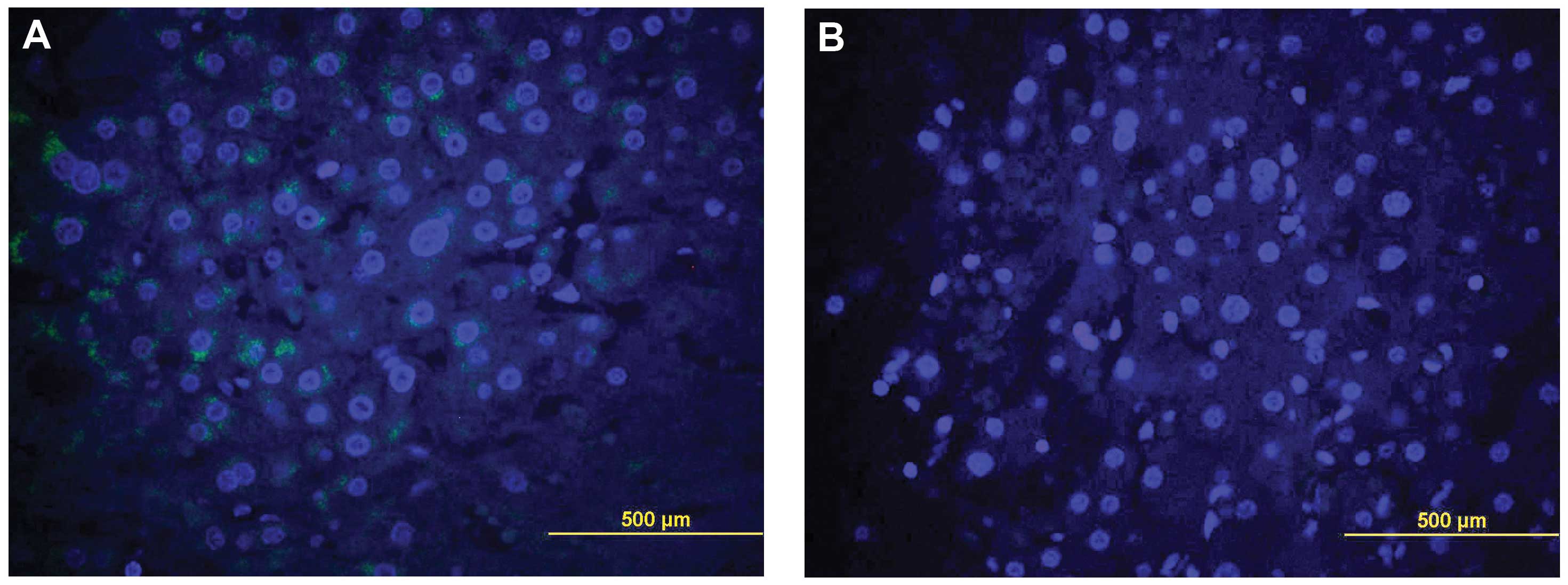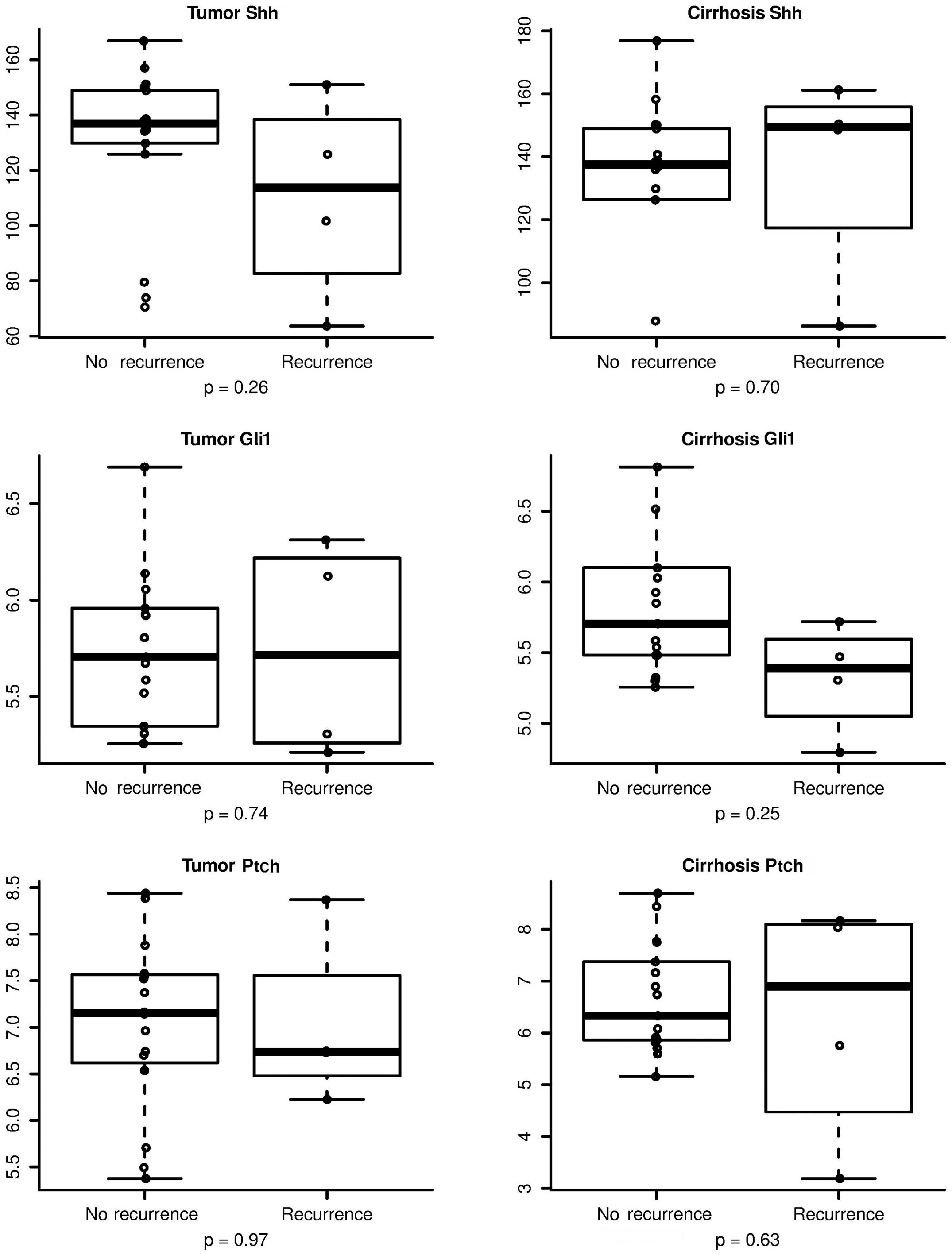|
1
|
Shahi MH, Rey JA and Castresana JS: The
sonic hedgehog-GLI1 signaling pathway in brain tumor development.
Expert Opin Ther Targets. 16:1227–1238. 2012. View Article : Google Scholar : PubMed/NCBI
|
|
2
|
Parkin CA and Ingham PW: The adventures of
sonic hedgehog in development and repair. I. Hedgehog signaling in
gastrointestinal development and disease. Am J Physiol Gastrointest
Liver Physiol. 294:G363–G367. 2008. View Article : Google Scholar : PubMed/NCBI
|
|
3
|
Jeng KS, Sheen IS, Jeng WJ, Lin CC, Lin
CK, Su JC, Yu MC and Fang HY: High expression of patched homolog-1
messenger RNA and glioma-associated oncogene-1 messenger RNA of
sonic hedgehog signaling pathway indicates a risk of postresection
recurrence of hepatocellular carcinoma. Ann Surg Oncol. 20:464–473.
2013. View Article : Google Scholar : PubMed/NCBI
|
|
4
|
Che L, Yuan YH, Jia J and Ren J:
Activation of sonic hedgehog signaling pathway is an independent
potential prognosis predictor in human hepatocellular carcinoma
patients. Chin J Cancer Res. 24:323–331. 2012. View Article : Google Scholar : PubMed/NCBI
|
|
5
|
Parkin DM, Bray F, Ferlay J and Pisani P:
Global cancer statistics, 2002. CA Cancer J Clin. 55:74–108. 2005.
View Article : Google Scholar : PubMed/NCBI
|
|
6
|
El-Serag HB and Rudolph KL: Hepatocellular
carcinoma: Epidemiology and molecular carcinogenesis.
Gastroenterology. 132:2557–2576. 2007. View Article : Google Scholar : PubMed/NCBI
|
|
7
|
El-Serag HB and Mason AC: Rising incidence
of hepatocellular carcinoma in the United States. N Engl J Med.
340:745–750. 1999. View Article : Google Scholar : PubMed/NCBI
|
|
8
|
Llovet JM, Burroughs A and Bruix J:
Hepatocellular carcinoma. Lancet. 362:1907–1917. 2003. View Article : Google Scholar : PubMed/NCBI
|
|
9
|
Bruix J and Sherman M: Practice Guidelines
Committee, American Association for the Study of Liver Diseases:
Management of hepatocellular carcinoma. Hepatology. 42:1208–1236.
2005. View Article : Google Scholar : PubMed/NCBI
|
|
10
|
Macaron C, Hanouneh IA, Lopez R, Aucejo F
and Zein NN: Total tumor volume predicts recurrence of
hepatocellular carcinoma after liver transplantation in patients
beyond Milan or UCSF criteria. Transplant Proc. 42:4585–4592. 2010.
View Article : Google Scholar : PubMed/NCBI
|
|
11
|
Mazzaferro V, Regalia E, Doci R, Andreola
S, Pulvirenti A, Bozzetti F, Montalto F, Ammatuna M, Morabito A and
Gennari L: Liver transplantation for the treatment of small
hepatocellular carcinomas in patients with cirrhosis. N Engl J Med.
334:693–699. 1996. View Article : Google Scholar : PubMed/NCBI
|
|
12
|
Toso C, Trotter J, Wei A, Bigam DL, Shah
S, Lancaster J, Grant DR, Greig PD, Shapiro AM and Kneteman NM:
Total tumor volume predicts risk of recurrence following liver
transplantation in patients with hepatocellular carcinoma. Liver
Transpl. 14:1107–1115. 2008. View
Article : Google Scholar : PubMed/NCBI
|
|
13
|
Klintmalm GB: Liver transplantation for
hepatocellular carcinoma: A registry report of the impact of tumor
characteristics on outcome. Ann Surg. 228:479–490. 1998. View Article : Google Scholar : PubMed/NCBI
|
|
14
|
Ingham PW and McMahon AP: Hedgehog
signaling in animal development: Paradigms and principles. Genes
Dev. 15:3059–3087. 2001. View Article : Google Scholar : PubMed/NCBI
|
|
15
|
Berman DM, Karhadkar SS, Maitra A, De
Montes Oca R, Gerstenblith MR, Briggs K, Parker AR, Shimada Y,
Eshleman JR, Watkins DN, et al: Widespread requirement for Hedgehog
ligand stimulation in growth of digestive tract tumours. Nature.
425:846–851. 2003. View Article : Google Scholar : PubMed/NCBI
|
|
16
|
Sekulic A, Migden MR, Oro AE, Dirix L,
Lewis KD, Hainsworth JD, Solomon JA, Yoo S, Arron ST, Friedlander
PA, et al: Efficacy and safety of vismodegib in advanced basal-cell
carcinoma. N Engl J Med. 366:2171–2179. 2012. View Article : Google Scholar : PubMed/NCBI
|
|
17
|
Zheng X, Yao Y, Xu Q, Tu K and Liu Q:
Evaluation of glioma-associated oncogene 1 expression and its
correlation with the expression of sonic hedgehog, E-cadherin and
S100a4 in human hepatocellular carcinoma. Mol Med Rep. 3:965–970.
2010.PubMed/NCBI
|
|
18
|
Poon Tung-Ping R, Fan ST and Wong J: Risk
factors, prevention, and management of postoperative recurrence
after resection of hepatocellular carcinoma. Ann Surg. 232:10–24.
2000. View Article : Google Scholar : PubMed/NCBI
|
|
19
|
Chiu JH, Kao HL, Wu LH, Chang HM and Lui
WY: Prediction of relapse or survival after resection in human
hepatomas by DNA flow cytometry. J Clin Invest. 89:539–545. 1992.
View Article : Google Scholar : PubMed/NCBI
|
|
20
|
Ng IO, Lai EC, Fan ST, Ng M, Chan AS and
So MK: Prognostic significance of proliferating cell nuclear
antigen expression in hepatocellular carcinoma. Cancer.
73:2268–2274. 1994. View Article : Google Scholar : PubMed/NCBI
|
|
21
|
Suda T, Isokawa O, Aoyagi Y, Nomoto M,
Tsukada K, Shimizu T, Suzuki Y, Naito A, Igarashi H, Yanagi M, et
al: Quantitation of telomerase activity in hepatocellular
carcinoma: A possible aid for a prediction of recurrent diseases in
the remnant liver. Hepatology. 27:402–406. 1998. View Article : Google Scholar : PubMed/NCBI
|
|
22
|
Hayashi H, Sugio K, Matsumata T, Adachi E,
Takenaka K and Sugimachi K: The clinical significance of p53 gene
mutation in hepatocellular carcinomas from Japan. Hepatology.
22:1702–1707. 1995. View Article : Google Scholar : PubMed/NCBI
|
















